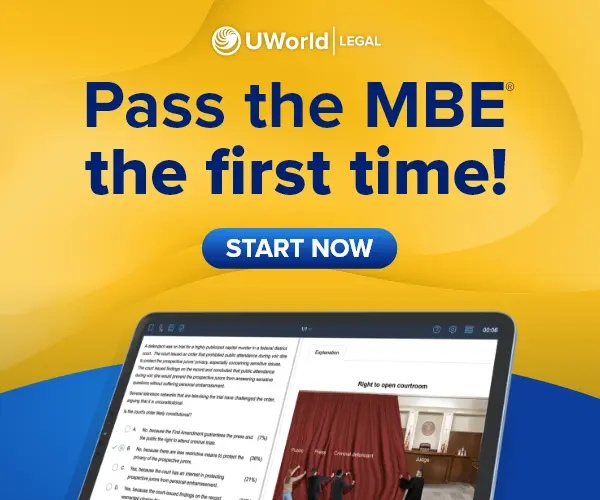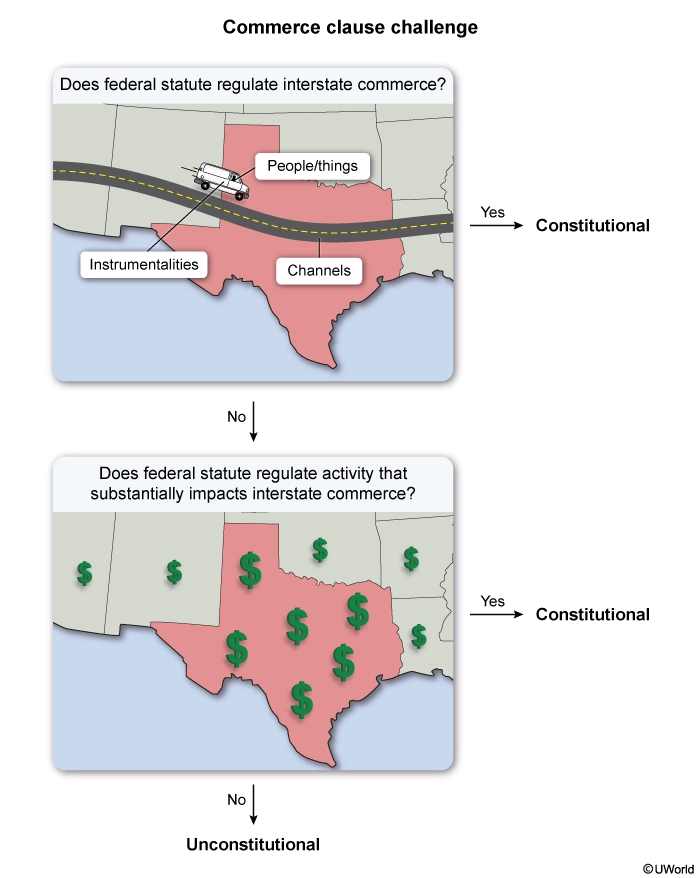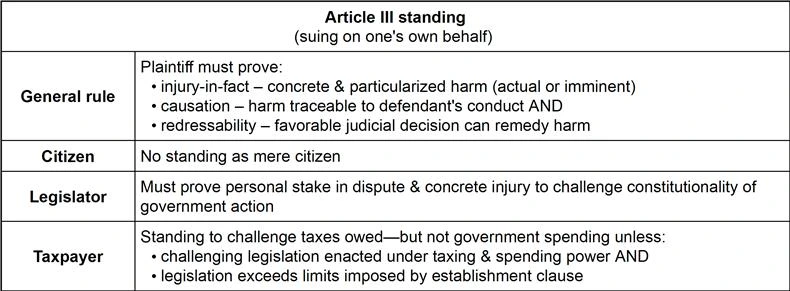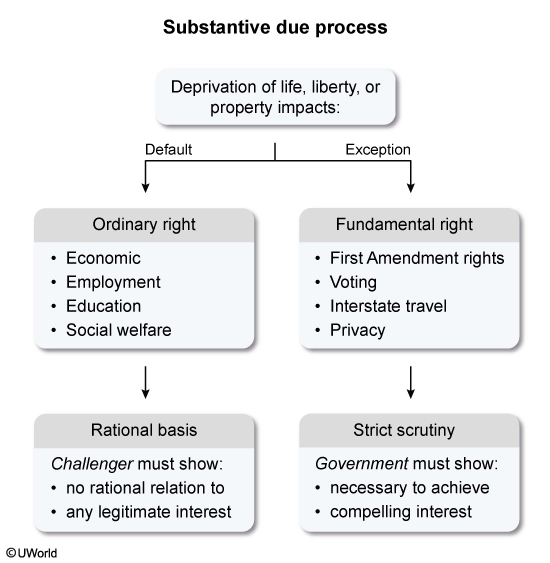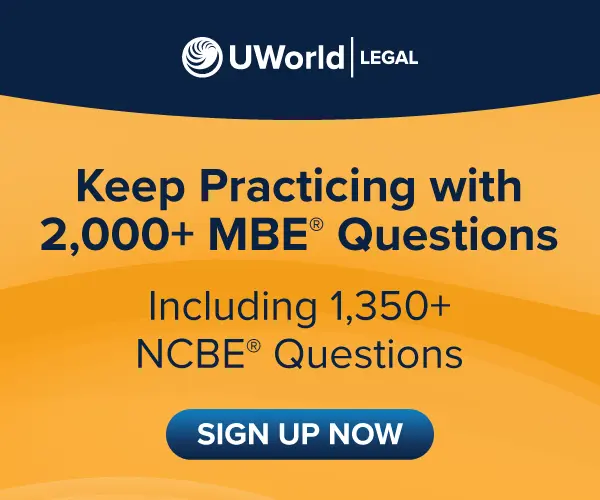The MBE is a 6-hour, 200-question multiple-choice exam developed by the National Conference of Bar Examiners (NCBE®) to assess how you can apply fundamental legal principles and legal reasoning to analyze given fact patterns. The 175 scored questions are broken down into 7 subject areas, including Constitutional Law, each containing 25 questions.
Constitutional Law covers 4 core areas: individual rights, judicial review, separation of powers, and the interplay between federal and state systems. Each subtopic demands a clear understanding of principles and their practical applications, reflecting the foundational role Constitutional Law plays in legal analysis.
What is Constitutional Law?
Constitutional Law outlines rights outlined in federal and state constitutions and is shaped by court rulings that uphold constitutional boundaries. Centered on the Bill of Rights, which covers freedoms including speech, religion, due process, and protection against unreasonable searches, Constitutional Law forms the foundation of many legal issues.
State constitutions may expand on federal rights but cannot override them. Given its broad impact and inclusion on the MBE, constitutional law is essential for legal professionals to understand the ‘rights’, ‘governance’, and ‘activism' in a constantly shifting legal landscape.
Constitutional Law: Topics, Weightage and Test Insights
The Constitutional Law section is considered one of the more challenging subjects, requiring deep and somewhat more ambiguous analysis to reach the correct answer.
Here are the subtopics of Constitutional Law that are tested on the MBE:
| Constitutional Law Topics | % Tested | # of Questions |
|---|---|---|
| Individual Rights | 50.00% | 12-13 |
| Nature of Judicial Review | 16.70% | 4-5 |
| Separation of Powers | 16.70% | 4-5 |
| Relation of Nation and States in a Federal System | 16.70% | 4-5 |
The NCBE has based 50% of the questions on individual rights, while the remaining 50% will be divided equally among Nature of Judicial Review, Separation of Powers, and the Relation of Nation and States in a Federal System.
Nature of Judicial Review
Judicial Review questions on the MBE (4-5 questions) assess the Article III requirement that federal courts handle only genuine “cases and controversies.”
These questions test several foundational principles:
- No Advisory Opinions: Federal courts cannot issue opinions unless they resolve a real, concrete dispute with legal consequences. Hypothetical questions or requests for general guidance are not justiciable.
- Standing: Plaintiffs must demonstrate a direct, specific injury caused by the defendant, which the court has the ability to remedy. Claims based on unenforced statutes or speculative harms do not satisfy this requirement.
- No Mootness: A case must remain relevant throughout the litigation process. For instance, in DeFunis v. Odegaard, the plaintiff’s near-graduation rendered his challenge to an affirmative action policy moot, as the court’s decision could no longer provide meaningful relief.
- Ripeness: Claims must involve an actual or imminent harm, not a hypothetical or uncertain future injury. Courts do not consider challenges to laws or policies unless they have a tangible effect on the plaintiff.
These principles collectively ensure that federal courts remain focused on resolving live, actionable disputes with meaningful consequences, preserving their constitutional role as arbiters of real legal conflicts rather than hypothetical debates. By adhering to these requirements, the judiciary upholds its mandate to deliver timely and impactful decisions within the limits of its jurisdiction.
Separation of Powers
You will see about 4-5 Separation of Powers questions on the exam. One of the most important things to remember is that Congress can only act based on its powers in the Constitution. All other powers are reserved for the states.
Many questions will ask you about an act by Congress and have you determine whether it is constitutional. You might see an answer choice that justifies a congressional action based on its "general police powers." This will be an incorrect answer choice. Congress does not have general police powers. Only the states do. An exception to this rule is if there is no state to enact these laws, like in the District of Columbia or on a military base, Indian lands, or federal land.
There are a few other ways the NCBE will try to trick you. For example, remember that Congress does not have the power to act for the general welfare, so any answer choice that says this will be incorrect. Congress only has the power to tax or spend for the general welfare.
Congress also cannot justify a law by referring solely to the Necessary and Proper Clause. This clause allows Congress to do anything necessary and proper to carry out another enumerated power. Thus, the key is that the action must be tied to some existing enumerated power. It is incorrect if the answer choice refers to the Necessary and Proper Clause.
Relation of Nation and States in a Federal System
The MBE dedicates 4-5 questions to the intricate balance of power between the nation and states, emphasizing federal supremacy and the dormant Commerce Clause. These questions explore how federal law preempts state law in 3 situations: when there’s a direct conflict, when state law hinders federal objectives, or when Congress regulates an area so comprehensively that no room remains for state involvement.
Equally tested is the dormant Commerce Clause, which limits states from discriminating against or burdening interstate commerce. Exceptions to this principle include instances where Congress expressly authorizes the discrimination, states act as market participants rather than regulators, or laws address traditional government functions. These questions require a nuanced understanding of federal-state dynamics and the constitutional boundaries that preserve the balance of power in a federal system.
Individual Rights
Individual rights are a key focus in Constitutional Law on the MBE, with 12-13 questions typically covering procedural due process, substantive due process, and the Equal Protection Clause. These questions demand knowledge of the concepts and the ability to apply different levels of scrutiny to various legal scenarios.
Procedural due process ensures the government cannot deprive a person of life, liberty, or property without notice and a fair opportunity to be heard. Substantive due process addresses laws that restrict everyone's activities. Laws affecting fundamental rights, such as voting or privacy, are subject to strict scrutiny, requiring the government to prove a compelling interest. For non-fundamental rights, rational basis review applies, where laws are presumed valid unless shown to lack a legitimate purpose, as is often the case with economic regulations.
The Equal Protection Clause addresses scenarios where laws treat individuals or groups differently. The level of scrutiny depends on the classification. Strict scrutiny, the most stringent standard, applies to laws involving race, ethnicity, or alienage and is rarely satisfied. Intermediate scrutiny, applied to classifications based on gender or illegitimacy, requires the government to show an important interest. Laws involving other classifications, such as age, are generally subject to rational basis review, where they are presumed valid unless proven otherwise.
To perform well in this area, focus on mastering the distinctions between procedural and substantive due process, understanding when strict scrutiny applies, and recognizing the different classifications and their corresponding levels of scrutiny under equal protection. These principles are often at the core of MBE scenarios.
How to Study for Constitutional Law
The seemingly never-ending debate over the U.S. Constitution and its interpretation makes studying for the Constitutional Law section of the bar exam unique and highly specialized.
The 25 Constitutional Law multiple-choice questions tested on the MBE can be difficult due to their length and numerous facts. It is critical to learn how to identify sources and types of judicial review, state and federal authority boundaries, due process rights, privileges, and immunity rights, First Amendment rights, and equal protection rights as they apply to different groups.
An effective study strategy is to create an initial Constitutional Law outline that contains all rules, exceptions, and easy-to-memorize charts. You can adjust your outlines as you learn better ways to phrase rules and easier ways to remember the concepts.
Preparing for Constitutional Law on the MBE
Answering Constitutional Law questions on the MBE requires a solid understanding of key concepts and a strategic approach. To perform well, focus on distinguishing similar provisions, mastering analyses, and using efficient study techniques.
- Understand the distinction between Equal Protection and Substantive Due Process. Substantive due process addresses laws restricting fundamental rights for everyone, requiring strict scrutiny. Equal Protection focuses on laws treating groups differently, applying strict scrutiny for race, intermediate scrutiny for gender, and rational basis for classifications like age. For First Amendment questions, identify key elements such as speech regulation and the establishment clause. Apply relevant tests, such as the Lemon test for church-state separation, and recognize exceptions like historical practices.
- Avoid common traps. Don’t assume Congress can act broadly under “General Welfare” or overlook limits on taxpayer standing, which generally disallows challenges unless tied to the establishment clause. Prioritize highly tested topics, including individual rights, which make up 50% of Constitutional Law questions. Rewriting notes, creating charts, and practicing questions improve retention.
- Manage your time effectively. With 200 questions to answer in 6 hours, focus on eliminating incorrect options quickly, narrowing down choices, and moving on if you’re uncertain to avoid wasting valuable time. Consistent practice using UWorld’s MBE QBank can help you refine these skills, as it offers realistic questions and detailed answer explanations tailored to sharpen your approach and build confidence for exam day.
Constitutional Law Sample Questions and Answers
Here are some practice questions from the UWorld MBE QBank:
A congressional committee investigated the pharmaceutical industry and found that the high cost of prescription drugs purchased and sold in the United States negatively impacted the nation's economy and the health of its citizens. In response, Congress passed a statute that regulates "the retail prices of every purchase or sale of prescription drugs in the United States."
A group of pharmaceutical companies challenged the constitutionality of this statute in federal court.
What is the strongest argument in support of the constitutionality of this statute?
- Congress may enact statutes for the general welfare.
- Congress may regulate the prices of all domestic purchases and sales of goods.
- The Constitution grants Congress the power to regulate the interstate transportation of prescription drugs.
- The purchases and sales of prescription drugs in the United States substantially impact interstate commerce in the aggregate.
The commerce clause gives Congress broad power to regulate interstate and foreign commerce. This includes:
- the channels of interstate and foreign commerce (eg, roadways)
- the instrumentalities of interstate and foreign commerce (eg, vehicles)
- persons and things moving in interstate or foreign commerce (eg, goods and services) and
- in-state activities that, singly or in the aggregate, substantially impact interstate or foreign commerce.
Since Congress's commerce power is broad, federal statutes are constitutional if there is any rational basis for concluding that the regulated activity substantially affects interstate or foreign commerce. This can be shown through express congressional findings.
Here, the federal statute regulates the retail prices of prescription drugs in the United States. Congress has the authority to regulate such products' interstate transportation, but this statute also regulates in-state purchases and sales (Choice C). Since the congressional committee found that the high cost of prescription drugs negatively impacted the nation's economy, it is rational to conclude that their aggregated in-state purchases and sales substantially impact interstate commerce. Therefore, this is the strongest argument to support this statute.
(Choice A) The taxing and spending clause empowers Congress to tax and spend for the general welfare. But regulating prices is not equivalent to taxing or spending.
(Choice B) Congress cannot regulate the prices of every domestic purchase and sale of goods since it cannot regulate purely in-state sales that do not substantially affect interstate commerce.
Educational objective:
The commerce clause empowers Congress to regulate (1) channels and instrumentalities of, (2) persons and things moving in, and (3) in-state activities that—singly or in the aggregate—substantially affect interstate or foreign commerce.
Bluebook Citations :
- Gonzales v. Raich, 545 U.S. 1, 17 (2005) (explaining Congress's broad authority under the commerce clause).
A federal statute provides funds to private organizations that develop online learning materials for schools. A provision of the statute requires organizations that receive such funds to provide their educational materials to private, religious schools for use in their curriculum on the same terms that the organizations provide to public schools.
A taxpayer brought a suit in federal court to challenge the federal statutory provision as violating the establishment clause of the First Amendment. The taxpayer does not work in the education industry, nor does he have any children.
Does the taxpayer have standing to challenge the provision?
- No, because the private organizations receiving the federal funds are not state actors.
- No, because the provision did not cause the taxpayer to suffer a concrete and particularized injury.
- Yes, because taxpayers have the right to challenge how Congress spends federal funds.
- Yes, because the taxpayer's challenge is based on the establishment clause.
A federal court will not hear a case unless the plaintiff has standing—i.e., a personal stake in the outcome of the case. To have standing, the plaintiff must assert an injury-in-fact that is concrete and particularized—a generalized grievance shared by many or all citizens is insufficient. Therefore, taxpayers lack standing to challenge the way the government spends tax dollars unless the taxpayer:
- challenges legislation enacted under Congress's or a state's taxing and spending power and
- alleges a violation of a specific constitutional limitation on this power—to date, the only limitation that the U.S. Supreme Court has found is the First Amendment establishment clause.
Here, the taxpayer is challenging a federal statute that provides funds to private organizations to develop online learning materials for schools (exercise of congressional spending power). He is specifically challenging the statutory provision requiring such organizations to provide materials to private, religious schools as a violation of the First Amendment establishment clause (specific constitutional limitation). The taxpayer therefore has standing to challenge this provision.
(Choice A) With the exception of the Thirteenth Amendment, the Constitution applies to government (i.e., state) action. Private action is considered government action only if the state-action doctrine applies. But here, the taxpayer is challenging a federal law, so there is no need to determine whether the private organizations are engaging in state action.
(Choice B) The statutory provision did not cause the taxpayer to suffer a concrete and particularized injury since he does not work in the education industry and does not have children who may be affected by the provision. However, as a taxpayer, he has standing to challenge the provision as violative of the establishment clause.
(Choice C) Taxpayers have the right to challenge how Congress spends federal funds only when the challenge alleges a violation of a specific constitutional limitation on Congress's taxing and spending power (as seen here).
Educational objective:
A plaintiff-taxpayer has standing when his/her suit (1) challenges legislation enacted under Congress's taxing and spending power and (2) alleges a violation of a specific constitutional limitation on that power (i.e., the establishment clause).
Bluebook Citations :
- U.S. Const. art. III, § 2 (defining the case-or-controversy requirement).
- Flast v. Cohen, 392 U.S. 83, 102–04 (1968) (establishing the narrow exception to the rule against taxpayer standing).
A state legislature enacted a statute that allowed executors to claim a tax deduction for the sale of securities that were purchased by an estate after the decedent's death. After the statute was enacted, the state suffered a significant decrease in revenue because the number of estates that claimed the tax deduction was greater than originally projected. To recover this lost revenue, the legislature amended the statute to prevent an estate from claiming the deduction unless the decedent owned the securities prior to death. The amendment was made retroactive so that its effective date was when the statute was initially enacted.
Before the amendment was enacted, an executor sold securities that he had purchased for a decedent's estate after her death. The executor attempted to claim the tax deduction on the estate's tax returns but the state agency that processes tax returns denied his claim even though the estate had purchased the securities before the amendment was enacted. The executor has filed suit against the agency to challenge the constitutionality of the retroactive application of the amendment.
Is the executor's suit likely to succeed?
- No, because the retroactive application of the amendment was necessary to achieve a compelling government interest.
- No, because the retroactive application of the amendment was rationally related to a legitimate government interest.
- Yes, because the amendment constitutes a bill of attainder.
- Yes, because the amendment violates the due process clause of the Fourteenth Amendment.
The Fourteenth Amendment substantive due process clause prevents states from depriving persons of life, liberty, or property without adequate justification. Civil laws that retroactively impair an ordinary right—eg, the right to claim a tax deduction—must undergo rational basis scrutiny. Under this test, the law is presumed valid until the challenger shows that the law's retroactive application has no rational relation to any legitimate government interest.
Here, the executor challenged the amendment's retroactive application since it prevented the estate from claiming the tax deduction on its tax returns, which is an ordinary right. But since the state suffered a significant decline in revenue after the statute was enacted, the retroactive application of the amendment was rationally related to the state's legitimate interest in recovering the lost revenue. This means that the amendment does not violate the Fourteenth Amendment due process clause (Choice D). Therefore, the executor's suit is unlikely to succeed.
(Choice A) The retroactive application of a law that affects a fundamental right (eg, voting) is subject to strict scrutiny—ie, the government must prove that the law is necessary to achieve a compelling government interest. But here, the amendment's retroactive application affects an ordinary right and is therefore subject to rational basis scrutiny.
(Choice C) A bill of attainder is a legislative act that punishes a specified person or group without a judicial trial. But since the amendment applies to all persons who purchase securities, it is not a bill of attainder. Additionally, the amendment seeks to increase the state's revenue—not punish individuals.
Educational objective:
Laws that retroactively impair an ordinary right—eg, the right to claim a tax deduction—can be challenged on substantive due process grounds. Such laws are reviewed under rational basis scrutiny and generally are presumed valid.
Copyright © UWorld. All rights reserved.
Frequently Asked Questions
How many Constitutional Law questions are on the MBE?
The MBE contains 25 questions on Constitutional Law that test your understanding of the foundational principles and application of constitutional concepts.
What are the 4 Constitutional Law topics covered on the MBE?
The MBE tests you on 4 primary topics within Constitutional Law: individual rights, separation of powers, nature of judicial review, and relationship between the nation and states.
What are the most-tested topics in Constitutional Law?
Individual rights dominates the section, accounting for 50% of the questions. This reflects the importance of understanding constitutional protections such as due process, equal protection, and freedom of speech. The remaining 50% is evenly divided among 3 topics: separation of powers, the nature of judicial review, and the relationship between the nation and states.
Why is Constitutional Law important for the MBE?
Constitutional Law is a cornerstone of the legal system, and its inclusion on the MBE highlights its significance. It equips future lawyers with the knowledge needed to navigate cases involving fundamental rights, government powers, and federal relationships.


